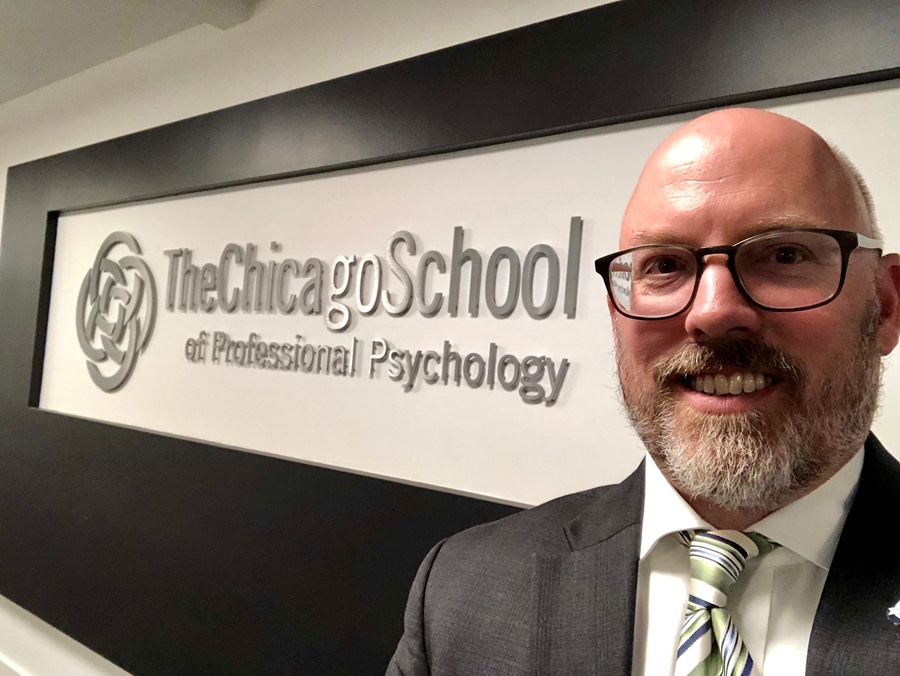University of Arkansas alumnus Michael Kocet has been interviewed by CNN, EatingWell magazine and The Washington Post, among others, about how cooking can help reduce stress and anxiety during the COVID-19 pandemic.
For over six years, his culinary therapy classes have served many of his mental health counseling students well. But his reach has exploded over the past eight months. Through these interviews, Kocet has been able to share about the benefits of mindful cooking and eating with a much wider audience.
A licensed mental health counselor, professor and department chair of the Counselor Education Department at The Chicago School of Professional Psychology, Kocet hopes his words have helped bring healing.
He learned about the benefits of culinary therapy when he began taking cooking classes in Boston around 2006. He was working as a Counselor Education faculty member at Bridgewater State University at the time. When he'd mention the classes to friends or colleagues, they'd inevitably gush about how cooking was great for their mental health. A light bulb went off.
"In the field of mental health counseling and behavioral sciences, there is art therapy, drama therapy, music therapy, and more," Kocet said. "It occurred to me that nobody had really created cooking therapy before.
"As far as I know, I'm one of the only professors in my field who has created a course on cooking therapy."
Kocet developed the graduate-level counseling class in 2014. It was so well received, he had to expand the program. The course focuses on mindful cooking and eating as a way to work through difficult emotions. As Kocet noted in EatingWell, people all over the globe are dealing with collective loss right now — whether it be jobs, routine, or, tragically, the people they love — and cooking can be cathartic.
He said cooking or baking a dish from your childhood can evoke strong emotions in the midst of trauma.
"I often encourage clients to make a dish to honor a loved one and use all of their senses to connect with their grief," he said.
During the pandemic, cooking and baking has become even more meaningful to Kocet.
"It's been a source of comfort and happiness for me," he said.
Kocet said at the beginning, when he wasn't getting out at all, he used the money he saved — by not eating out at pricey Chicago restaurants — to buy gadgets for his kitchen. He ordered new Japanese knives, a silicone dough rolling bag, some cast iron cookware.
"I've made some of my comfort food recipes, but I've also experimented and tried some new recipes, such as scallops with leek and sugar snap pea risotto and a Dutch baby with raspberries and blackberries," he said.
All that time in the kitchen has helped him not only eat well, but be well.
"I think for people who enjoy cooking and baking, the process can help reduce depression, anxiety and stress," he said. "Cooking and baking can help us focus on following a recipe and creating a product — a dish — that we can see, smell and taste. It can be a comfort when there is a great deal of uncertainty in the world these days."
Uncertainty and loss sparked Kocet's interest in counseling as a career.
"I went to a counselor early in life to deal with some family issues," he said. "After that, I decided I wanted to help people as a counselor and give back because of how much therapy helped me grow."
Kocet earned a doctorate in 2001 from the U of A Counselor Education and Supervision program in the College of Education and Health Professions.
He recently received one of counseling's highest recognitions in the profession. He was named an American Counseling Association Fellow. Fellows are recognized for their lifetime contribution to the counseling profession.
"I was very touched to have been nominated by a colleague and chosen by my peers for this national recognition," he said.
Kocet's professional areas of interest include ethical issues in counseling, counseling LGBTQ+ clients and grief counseling. He's the author of numerous journal articles and book chapters on these topics.
He'd like to share his expertise on other platforms in the future.
"My goal is to have a program or channel on social media bringing cooking therapy to people all over the world," he said. "I also want to write a few more books, one on grief counseling and, of course, one on Cooking Therapy."
This story is the latest in a series called the Dean's Spotlight, featuring outstanding students in the College of Education and Health Professions. Visit COEHP's online magazine, the Colleague, for more news from the six units that make up the College. Visit the Counselor Education and Supervision page for more information on COEHP's counseling program.
Topics
Contacts
Shannon G. Magsam, director of communications
College of Education and Health Professions
479-575-3138,
